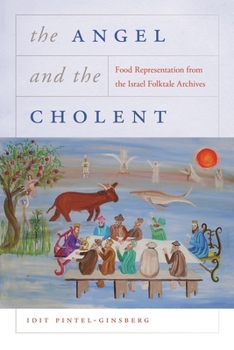The Angel and the Cholent: Food Representation from the Israel Folktale Archives
(Part of the Raphael Patai Series in Jewish Folklore and Anthropology Series)
Select Format
Select Condition 
Book Overview
A collection of food-focused folktales from the Israel Folktale Archives.
The Angel and the Cholent: Food Representation from the Israel Folktale Archives by Idit Pintel-Ginsberg, translated into English for the first time from Hebrew, analyzes how food and foodways are the major agents generating the plots of several significant folktales. The tales were chosen from the Israel Folktales Archives' (IFA) extensive collection of twenty-five thousand tales. In looking at the subject of food through the lens of the folktale, we are invited to consider these tales both as a reflection of society and as an art form that discloses hidden hopes and often subversive meanings.
The Angel and the Cholent presents thirty folktales from seventeen different ethnicities and is divided into five chapters. Chapter 1 considers food and taste--tales included here focus on the pleasure derived by food consumption and its reasonable limits. The tales in Chapter 2 are concerned with food and gender, highlighting the various and intricate ways food is used to emphasize gender functions in society, the struggle between the sexes, and the love and lust demonstrated through food preparations and its consumption. Chapter 3 examines food and class with tales that reflect on how sharing food to support those in need is a universal social act considered a "mitzvah" (a Jewish religious obligation), but it can also become an unspoken burden for the providers. Chapter 4 deals with food and kashrut--the tales included in this chapter expose the various challenges of "keeping kosher," mainly the heavy financial burden it causes and the social price paid by the inability of sharing meals with non-Jews. Finally, Chapter 5 explores food and sacred time, with tales that convey the tension and stress caused by finding and cooking specific foods required for holiday feasts, the Shabbat and other sacred times.
The tales themselves can be appreciated for their literary quality, humor, and profound wisdom. Readers, scholars, and students interested in folkloristic and anthropological foodway studies or Jewish cultural studies will delight in these tales and find the editorial commentary illuminating.





